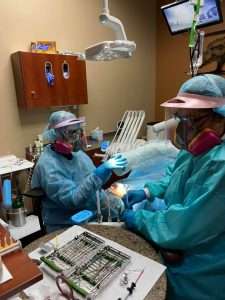Earlier this month, the World Health Organization advised that, due to COVID-19, “routine,” preventive, and elective dental procedures should be postponed. This is largely because of the aerosols generated by many common dental procedures increasing risk of transmission.
However, there is not a single documented case of a patient becoming infected with the novel coronavirus during dental care. In fact, most of the risk is to the dentist, hygienist, and other dental workers.

Notably, biological dentists who follow safe amalgam removal procedures such as the IABDM’s PROTECT Protocol are among the best prepared to follow the new safety guidelines since such equipment and practices were already part of their practices long before COVID emerged as a threat.
Preliminary research also suggests that rinsing with certain mouthwashes may greatly reduce the COVID viral load in the oral cavity – and thus the amount of virus that may be aerosolized during dental procedures. Rinsing before treatment has thus become more common – and yet another way we can limit transmission in the dental setting.
The timing of WHO’s statement is rather strange, as well, considering the steady stream of research highlighting a potential relationship between oral health and COVID severity.
Most recently, a paper soon to be published in the Journal of the California Dental Association found that patients with gum disease were more likely to experience life-threatening complications if hospitalized with COVID-19 – a risk the authors attribute to a protein called IL-6, which is produced in periodontitis.
“Gum disease has been linked to other breathing ailments, including pneumonia and chronic obstructive pulmonary disease, so we weren’t surprised to find a link to respiratory problems with COVID-19,” said researcher Shervin Molayem, DDS, a dental surgeon based on Los Angeles and founder of the UCLA Dental Research Journal.
“What shocked us was the discovery of the protein’s devastating, life-threatening impact to patients once they’re hospitalized. One tiny, inflammatory protein robbed them of their ability to breathe,” said Molayem.
This study echoes earlier research, such as this BDJ paper, linking oral health with COVID symptom severity. And there is a vast body of research linking gum disease with other respiratory ailments, including pneumonia.
At the same time, we’ve also begun to see the rise of what’s being called “mask mouth” – bad breath, decay, gum recession, and more resulting from wearing masks all the time to limit viral spread.
“We’re seeing inflammation in people’s gums that have been healthy forever, and cavities in people who have never had them before,” says Dr. Rob Ramondi, a dentist and co-founder of One Manhattan Dental. “About 50% of our patients are being impacted by this, [so] we decided to name it ‘mask mouth’ — after ‘meth mouth.’ ”
Yes, the mask intended to keep others safe could actually raise your own risk of complications, should you become infected – though in fairness, this clinical observation needs to be proved or disproved through empirical research.
In the meantime, we know full well that oral health and whole body health depend on each other. Even the CDC notes that dental care should be considered an essential part of healthcare and stresses the need for prevention.
The time to go to the dentist is now – provided they are following proper safety protocols, both for your sake and theirs.
